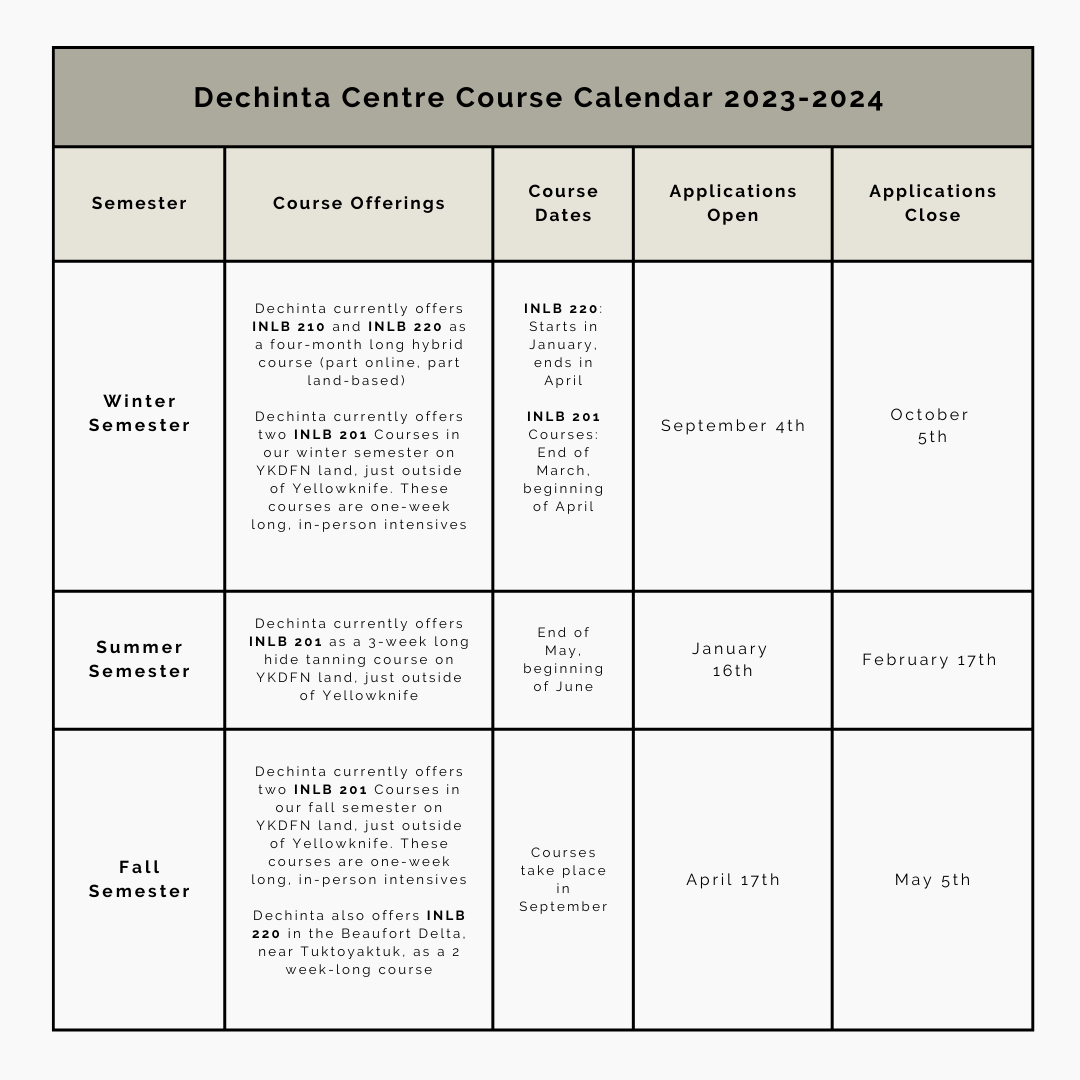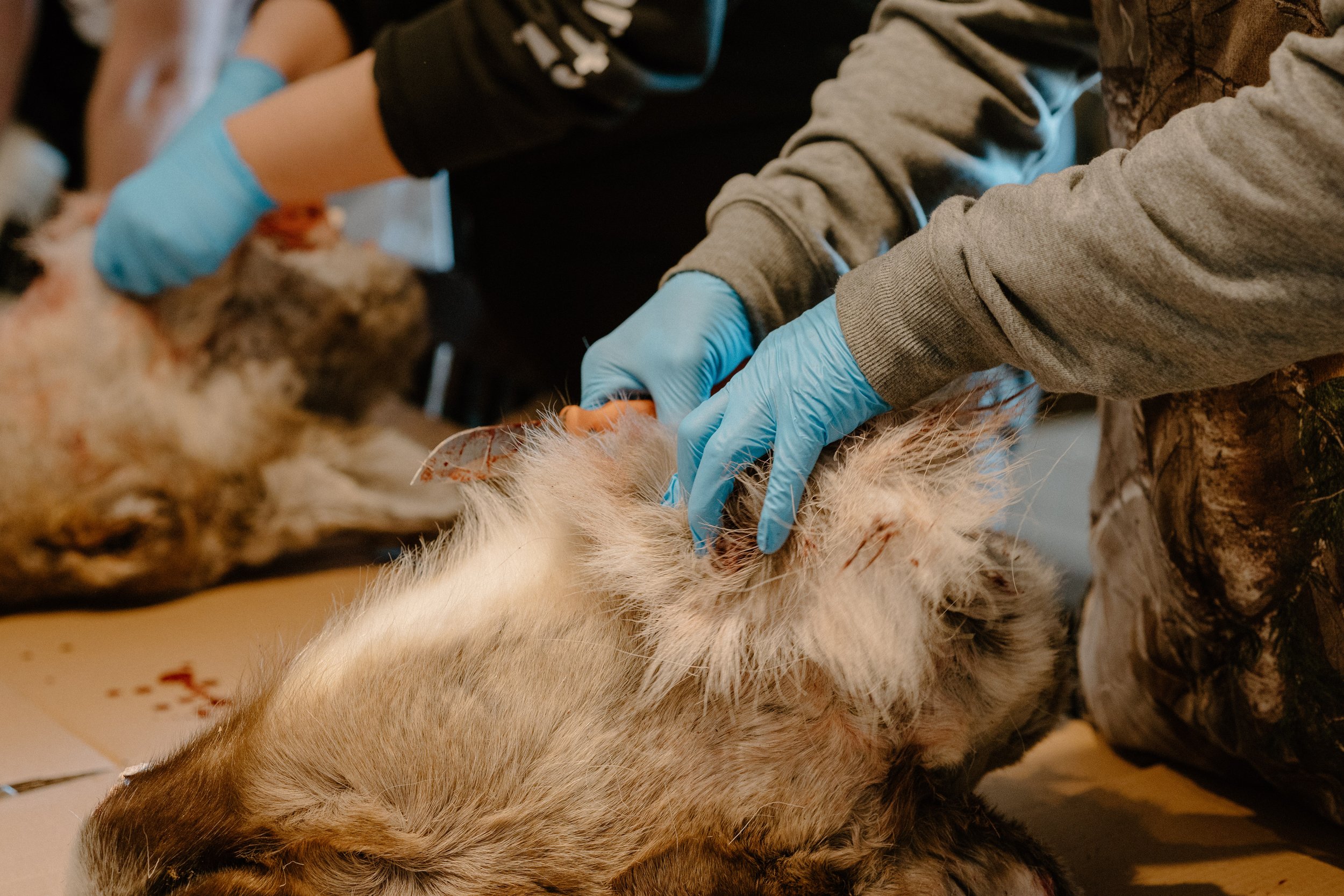
Our Accredited Programs
Our courses involve land-based and cultural practices, as well as university lectures from our Dechinta faculty members. Students spend a significant amount of time on the land learning skills, harvesting, and engaging with Elders. This is supplemented by ‘classroom work’ where students learn Indigenous theories and engage their critical thinking skills.
Depending on the season and the program, students can expect to learn: How to check fish nets, practices around fish nets, learning fish classification, learning Wíilíideh words for fish, how to chop wood, how to light and keep a fire going, how to cut fish, how to filet fish, how to make dry fish, different ways of showing respect for the fish, how to check for muskrat pushups, how to harvest a muskrat, how to clean and skin a muskrat, how to make bannock, how to snowmobile, how to bead and sew, different artistic practices, how to set a rabbit snare, how to look for spruce gum, how to properly ask for consent when harvesting on the land, how to use tobacco to show respect, how to identify animal tracks in the snow, how to soak and tan hide, how to make a birchbark canoe, and how to make tools, to name a few.
As students complete the land-based component of Dechinta, they will also learn about different topics and theories in Indigneous studies from Dechinta faculty and guest speakers, such as: governance, language, Indigenous science, history, law, guardianship, research, Indigenous arts, storytelling, and writing.
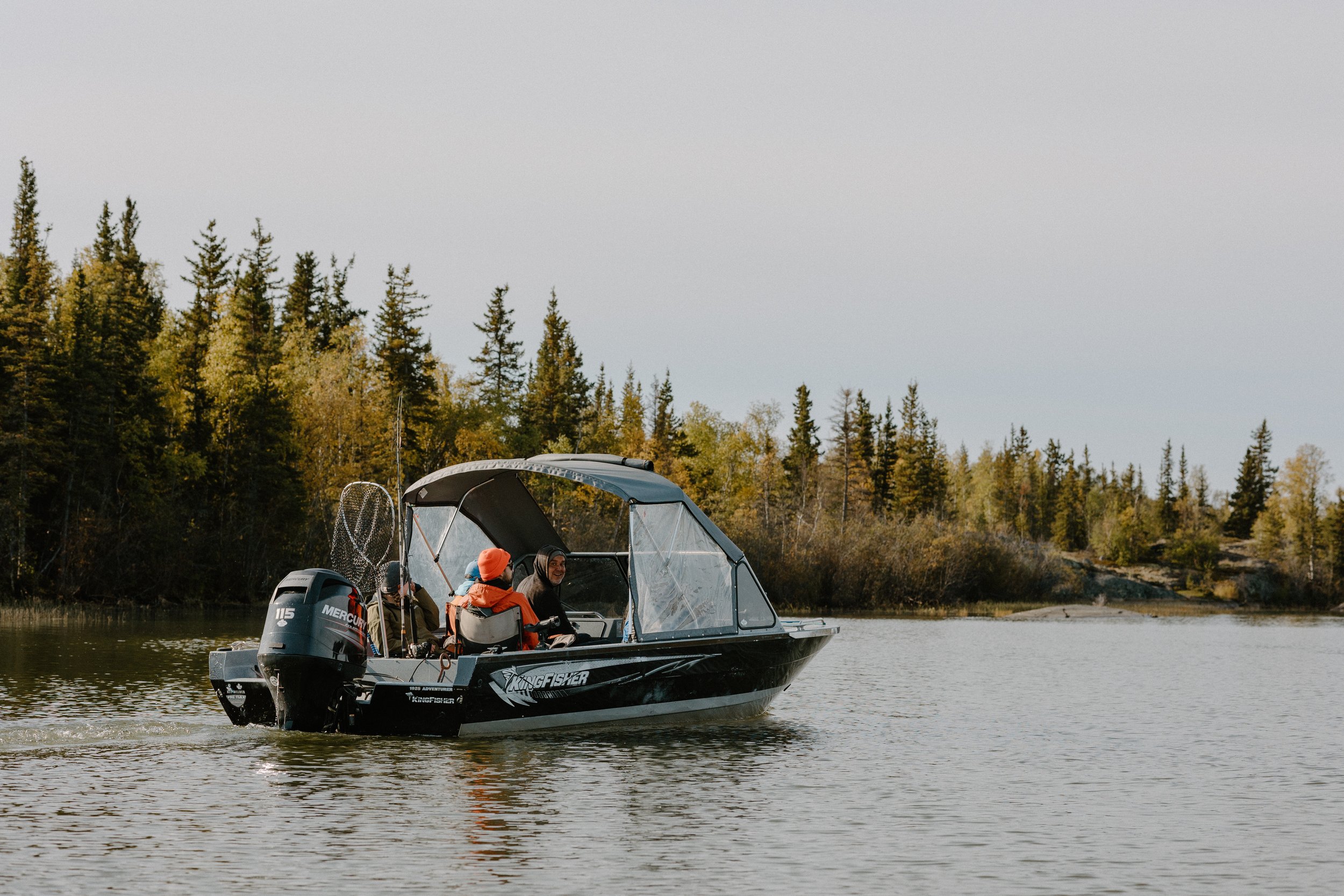
Dechinta Course Offerings
Dechinta is currently offering a number of short accredited courses for students every year. These courses are usually one to three weeks long, depending on the program. In our winter and fall semesters, we will often run two land-based courses back-to-back. Many of our students will register to take both, some students will only take one, and some students take a variety of courses over the different seasons of the year.
Students can take courses at Dechinta as stand-alone courses where they can receive credits towards their post-secondary degree (or future degree if not currently enrolled in university), or students can work towards the Dechinta Certificate in Land and Community Based Research in partnership with the University of British Columbia. To receive this post-secondary certificate students must attend five Dechinta courses (more information below).
Accommodations during the course will vary by program and student needs. Some of our programming requires students to stay onsite at the Dechinta camp for the duration of the program, while some of our programming takes place in hybrid formats and some allows local students to go home at night or stay at camp part-time. Once you are accepted to a Dechinta program, we will work together to arrange your accommodations and make sure you are prepared for a safe and accessible experience on the land. The location of our camp changes depending on the season, availability of a location, accessibility needs, staff available to work, students enrolled, and programs being offered.
In partnership with the University of British Columbia, Dechinta offers accredited courses in a community land-based environment. These courses are ‘Indigenous Land-Based Studies’ (INLB) Courses. Dechinta currently offers the following:
INLB 201 – Special Topics in Indigenous Land-Based Studies: Topics and studies vary from year to year. The past few courses Dechinta has offered included: Fish and Indigenous Aesthetics, Living the Dene Laws, Storytelling and Creative Practice, Hide Tanning and Research Methods. In the past, Dechinta has also offered INLB 252 – Introduction to Gender Justice.
INLB 210 – Land and Indigenous Self-Determination: Introduction to Theoretical Perspectives: This course is an introduction to the core theories of Indigenous Governance and Self-determination as put into practice by Northern Indigenous knowledge holders, artists, cultural practitioners, and community-builders. In the past, Dechinta has offered this course as a hybrid course where students attend lectures online while participating in local land-based programming.
INLB 220 – Land and Indigenous Self-Determination: Introduction to Methods and Application: This course is a 100% land-based course and is required to complete the Dechinta Certificate in Land Based Research, and to take the course students must have completed another Dechinta course. Students will spend each day on the land with land-based educators, including Elders, harvesters, and Dene Knowledge Holders. Activities will be dependent upon weather and may include setting nets, fishing nets, making dry fish, muskrat trapping, traveling the land, and making projects led by Elders.
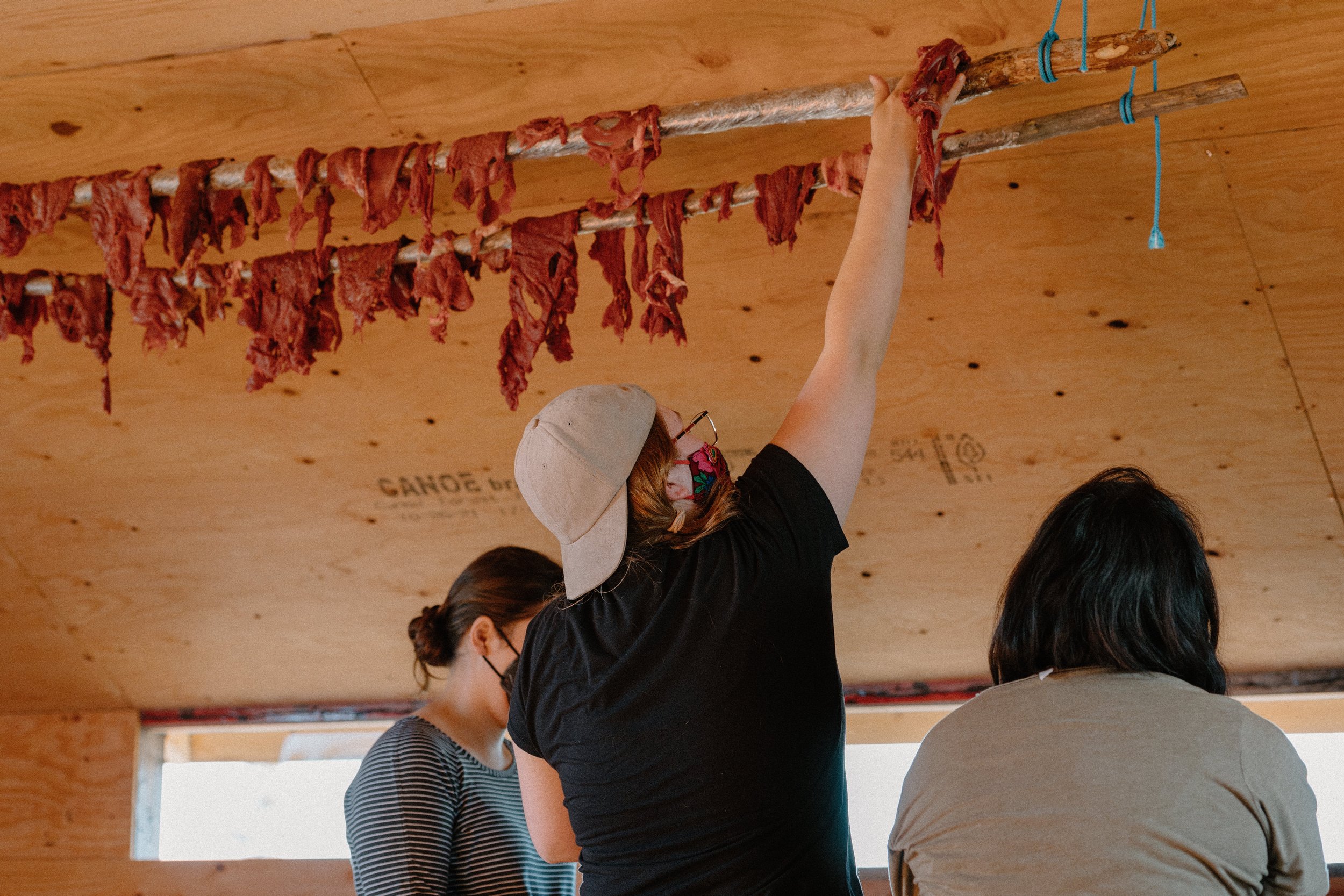
Dechinta Course Calendar
The dates and locations of our Dechinta courses differ slightly each year, but we consistently offer courses in three seasonal semesters:
Winter Courses (usually offered in Yellowknife region in March/April)
Summer Courses (usually offered in Yellowknife region in May/June)
Fall Courses (usually offered in the Beaufort Delta and Yellowknife regions in September)

Dechinta Certificate in Land-Based Research
Offered in partnership with the University of British Columbia, Dechinta students have the option to work towards graduating with an open studies post-secondary certificate in Land and Community Based Research.
Certificate Description: The Dechinta Certificate in Land and Community Based Research combines critical Indigenous studies with on-the-ground land-based practices. During the course of completing this certificate, students will gain a deeper understanding of: Indigenous education and ways of knowing, a critical perspective of colonialism and Western knowledge systems in Canada, the centrality of land to Indigenous lifeways and knowledge, community protocols and practices around research, and how to combine and acknowledge Indigenous theoretical perspectives alongside land-based wisdom. Learning and practicing land-based skills is the core focus of this program. Upon completing this certificate, students are better equipped for careers in teaching, non-profit work, land-based education, research and/or leadership in their own communities or in related organizations and fields.
The certificate consists of two interrelated components: Critical Indigenous studies (learning from Dechinta professors in a ‘classroom’) and land-based practices (learning that happens on the land with Elders, knowledge holders, and community members). The ‘theoretical’ portion of this program offers students a multidisciplinary education, bringing together faculty, guest speakers, and course topics from a wide variety of fields including Indigenous Governance, Political Science, Philosophy, Education, Law, Fine Arts and Gender Studies. Students are exposed to a variety of topics when completing this certificate, such as: decolonization and resurgence, self-determination, Indigenous research methods, Indigenous governance and legal traditions, Indigenous ethics, settler colonialism, Indigenous stewardship, storytelling and creative practice, gender justice and more.
At Dechinta, we aim to break down the divisions between hands-on learning and academic work in order to promote a more accurate understanding of Indigenous Knowledge. As students learn this theoretical knowledge it is simultaneously combined with the knowledge they are learning from their hands-on experience. Students have numerous opportunities during the program to form relationships and work with local Elders, knowledge holders and community members. This allows students to learn regional land-based skills, protocols, practices and history in a variety of seasons as they complete the certificate. Students will walk away from the program with a deeper knowledge and understanding of: local harvesting methods, land-stewardship, practices of consent, local cultural knowledge, history and stories from the region, Dene ethics and laws, and practices of relationship-building with their camp community and the more-than-human world.
To receive this university certificate, students must complete 5 of the courses offered by Dechinta that are accredited by the University of British Columbia. Students will be required to take 2 core courses (INLB 210 and INLB 220) and 3 option courses (INLB 252, INLB 201). The course offerings for the option courses will vary by semester and season. Any Dechinta accredited course that is not INLB 210 or INLB 220 will count as an option course that can go towards the UBC Certificate. These course credits can also be transferred to other post-secondary institutions to help students work towards completing their degree, with permission from their institution.
The certificate is designed to be completed in 1-2 years, but there is no set time period for completion. While the certificate can be finished in one year if you apply for courses in multiple semesters, students may also take as long as they need to receive all 5 credits.
Students may also take an upper-level version of the course by request. Most of our programs cater to people at different levels of postsecondary education –for some students it is their first time taking a University course, and for other students it may be the last course they are taking to graduate with their degree. If requested, we offer different course levels to accommodate the diverse needs of our students.
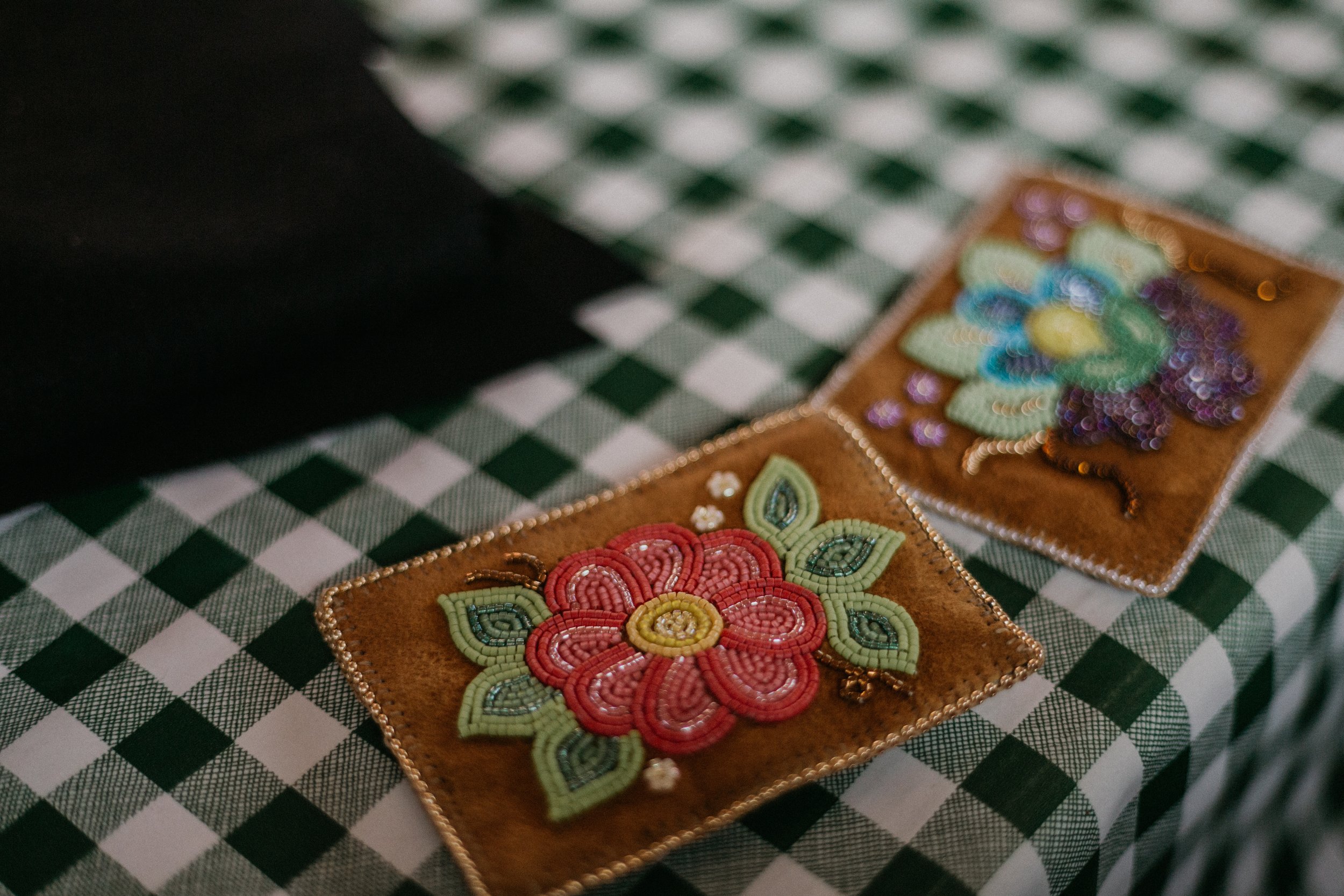
What to Expect at a Dechinta Program
Day-to-Day: The days you spend at a Dechinta camp will involve a combination of classroom activities (like lectures, workshops, discussions, and creative work) and land-based activities. Our programs and daily activities are deeply influenced by the weather, harvesting, and the seasons, and we are always open to what the land may want to teach us on any given day.
Staying Overnight: Depending on the course you are in, you may have an option to return home at the end of the day, however most of our programs are grounded in creating a community on the land where everyone lives together for the duration of the program. Dechinta provides canvas wall tents, cots and/or foamies, sleeping bags, firewood, and food. Our staff are onsite at all times to ensure you are able to stay safe and warm at camp.
Camp Governance: With the recognition that governance is a shared practice, we will begin our time together by establishing our shared governing principles as a community that will live, work, and learn together during our time on site. In order to agree on how to live together, we first need to learn about principles of consent, self-determination, personal freedom, and group accountability. Without a shared understanding of these values, community life can be much more challenging. Our first lessons on site will be about consent and self-determination, and how these principles can work to enable both personal freedom and group accountability. Together, we will create a set of shared guidelines to help us live together well during our time on site.
Community Life: When we are on the land, we are all learners, and we are all seeking out how to best contribute positively to our families, communities and nations. We want everyone to have the opportunity to chop wood, gather water, build fires, assist with childcare, hunt, fish, collect medicines, make tools, tan hides, cook, participate in ceremony and learn language. Some of us will naturally gravitate towards certain activities more than others, and there are many good ways to contribute positively to community life. We strive to create a gentle, kind, caring, empathetic, and respectful community when we are together. We are dedicated to helping and supporting each other.
Evaluation/Grading: In addition to the academic readings and assignments, 50% of the marks for most of our Dechinta courses is based on your participation at Camp. The land-based practices and Dene Knowledge you learn on the land will be evaluated by Dene Elders and Dene Knowledge Holders in conversation with the academic work assessed by the instructional team. Students are expected to show up, work hard and participate fully in camp activities. Respectful interpersonal interactions are a key part to healthy and fulfilling camp life. Co-created camp guidelines will shape camp interactions and expectations, including respectful and reciprocal interactions with Elders and Knowledge Holders, other students, staff, and community members in ways that honor their protocols, ethics, practices, values, procedures, processes, protocols and ways of expressing and embodying knowledge. To get the most out of your land-based experience, you must be present and work hard.
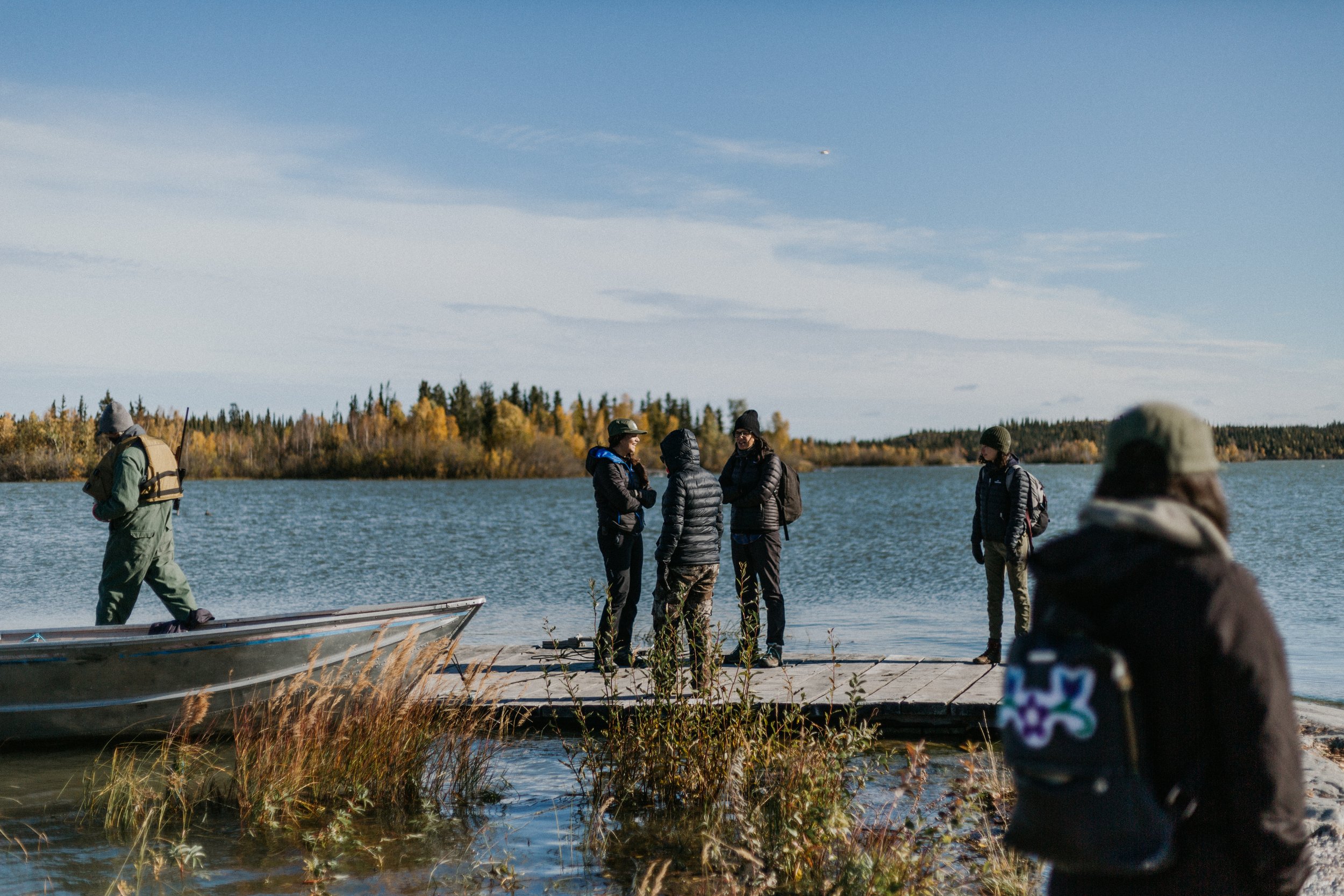
GUIDELINES FOR UBC STUDENTS
These are the guidelines for UBC students going to Dechinta. These guidelines were put together by Dechinta, CIS and Arts Academic Advising.
We recognize that each student has different circumstances. All applicants will be considered by UBC and Dechinta. Students are encouraged to discuss with their academic advisor at UBC and connect with Dechinta to discuss their application.
Students must have permission from their home faculty
Students typically have at least a 70% average in your most recent academic term calculated over 9 credits of completed coursework
Student should be in good academic standing (good academic standing is defined as not having a failed year, or being on academic probation
Process for Current UBC Students Going to Dechinta
Step 1: Plan Ahead
Discuss how your Dechinta courses will fit into your degree program with your faculty advisor. If you or your advisor have questions, reach out to cis.advising@ubc.ca.
Step 2: Application Process
Apply to the Dechinta Program directly: https://www.dechinta.ca/apply2025.
Note that applications to Dechinta from current UBC students will be reviewed by Dechinta and UBC.
Dechinta will be in touch with you regarding the outcome of your application.
Step 3: Concurrent Registration
If you are accepted into the Dechinta program and if your Dechinta courses will require you to miss scheduled course time at UBC:
Seek approval from all your course instructors by completing the Course Conflict Registration Form
One form will need to be completed for each course.
Completed forms can be submitted to Arts Indigenous Student Advising: arts.indigenous@ubc.ca.
Step 4: Registration
Once approval is granted, CIS will add your Dechinta courses to your course schedule. CIS will let you know when the courses have been added.
Step 5: Stay in Touch
If you have any questions reach out to CIS (cis.advising@ubc.ca) or your faculty advisor.


